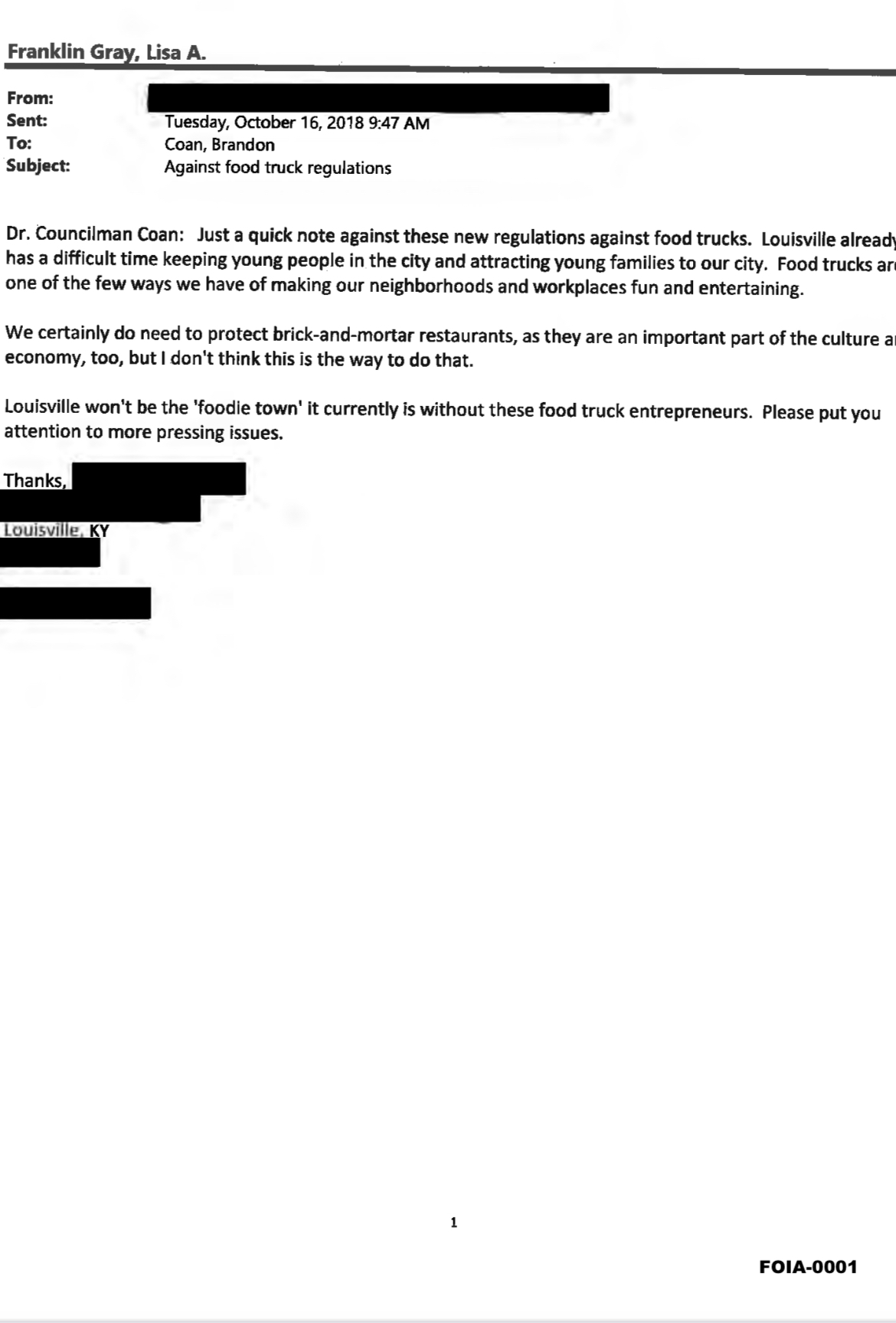

Courier Journal staff writer Billy Kobin reports that “[s]everal current and former Louisville Metro Council members must pay thousands in penalties and legal fees after a judge ruled they violated Kentucky's open records law in a case involving food truck regulations.”
https://www.courier-journal.com/story/news/politics/metro-government/20…
Kobin writes:
“Jefferson Circuit Judge Eric Haner ruled Wednesday the Institute for Justice, a law firm based in Arlington, Virginia, that had represented several Louisville food truck owners over the years in battles with the city, can recover $4,600 in statutory penalties and $9,263.50 in attorney fees from the four current and ex-council members.”
Although the less than $14,000 award of penalties and fees falls short of the $2 million payday the IJ anticipated in an earlier report, this may be one of the first times that officials, and not the public agency they serve, will bear the cost of fees and penalties in an open records case.
Kobin notes that “Metro Government typically pays judgements in cases against employees,” but he is seeking clarification on this question from the Jefferson County Attorney’s Office.
After receiving a partially favorable ruling from the Kentucky Attorney General in June 2019, IJ “sued current Metro Councilmen Scott Reed, R-16th District, and Pat Mulvihill, D-10th, and now-former Metro Council members Brandon Coan and Barbara Sexton Smith, both Democrats who represented District 8 and District 4, respectively, to try to obtain unredacted emails between them, business owners and residents related to proposed regulations on food trucks operating in the city.”
https://ag.ky.gov/Resources/orom/2019/19ORD084.doc
https://www.whas11.com/article/news/local/metro-council-food-truck-ordi…
https://kyopengov.org/blog/legal-battle-lines-have-once-again-been-draw…
https://kyopengov.org/blog/institute-justice-prevails-open-records-case…
In May, the Jefferson Circuit Court found that the council members violated the open records law by improperly redacting emails responsive to IJ’s records request. The court ruled on IJ’s right to attorneys fees and penalties on Wednesday.
Council members had challenged IJ’s $2 million estimate of their potential liability and the judge agreed, concluding that it is:
“appropriate to award IJ substantially less than the maximum amount of penalties authorized by KRS 61.882(5)," or $25 per day per record, "because the record shows that it has not consistently asserted its rights with the sort of diligence that would suggest an extraordinary amount of prejudice stemming from the initial delay" from the council members.
This, Judge Haner noted, “in no way excuses the Councilmembers' wrongdoing."
The open records law states: “Attorney's fees, costs, and awards under [KRS 61.882(5), relating to circuit court jurisdiction and the imposition of penalties and fees,] shall be paid by the agency that the court determines is responsible for the violation.”
https://apps.legislature.ky.gov/law/statutes/statute.aspx?id=23066
Under this statute, it is likely that the cost will be born by Metro Council (or Metro Government) and ultimately the taxpayers.
Public agency officials who willfully conceal or destroy records with the intent to violate the open records law can also be charged with a Class A misdemeanor and fined or imprisoned accordingly, but this did not occur here.
https://apps.legislature.ky.gov/law/statutes/statute.aspx?id=23117
It can be argued that there is no better deterrent to open records violations than requiring officials who are found to have willfully withheld public records to pay any attorneys fees and penalties imposed by a court from their own bank accounts, but the open records law states otherwise.
We will update this post when the question “who pays” is clarified.



